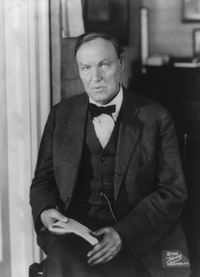|
|
Seeds of Fire: A People’s Chronology
Recalling events that happened on this day in history.
Memories of struggle, resistance and persistence.
Compiled by Ulli Diemer
|
April 18, 1644
|
|
|
Opechancanough, the leader of the Powhatan Confederacy in what is now the U.S. state of Virginia, launches one final attempt to drive out the British colonists who have been continuously seizing native land since 1607. Though Opechancanough is by this point more than 90 years old, he organizes a formidable campaign against the colonists. In the end, however, it fails. Opechancanough is taken prisoner, and then murdered: shot in the back.
|
|
April 18, 1857
|

|
|
Birth of Clarence Darrow (1857-1938), radical American lawyer and civil libertarian.
|
|
April 18, 1899
|

|
Rosa Luxemburg introduces her classic work, Reform or Revolution,, with these words:
At first view the title of this work may be found surprising. Reform or Revolution? Can the Social-Democracy be against reforms? Can we counterpose the social revolution, the transformation of the existing order, our final goal, to social reforms? Certainly not. The daily practical struggle for reforms, for the improvement of the condition of working people within the framework of the existing social order, and for democratic institutions, offers to the Social-Democracy the only means of engaging in the proletarian class struggle, and working towards the final goal – the conquest of political power and the elimination of wage labour. Between social reforms and revolution there exist for the Social Democracy an indissoluble link. The struggle for reforms is its means; the social revolution, its goal.
It is in Eduard Bernstein’s theory ... that we find, for the first time, these two elements of the labour movement counterposed against each other. His theory tends to counsel us to renounce social transformation, the final goal of Social-Democracy and, inversely, to make of social reforms, the means of the class struggle, its goal. Bernstein himself very clearly and characteristically formulated this viewpoint when he wrote: “The final goal, no matter what it is, is nothing; the movement is everything.”
But ... the final goal of socialism constitutes the only decisive factor distinguishing the Social-Democratic movement from bourgeois democracy and from bourgeois radicalism, the only factor transforming the entire labour movement from a vain effort to repair the capitalist order into a class struggle against this order, for the transformation of this order.
|
|
April 18, 1912
|
|
Coal miners in West Virginia go on strike. What the miners are asking for is simple:
That the operators accept and recognize the union;
That the miners' right to free speech and peaceable assembly be restored;
That black-listing discharged workers be stopped;
That compulsory trading at company stores be ended;
That cribbing be discontinued and that 2,000 pounds of mined coal constitute a ton;
That scales be installed at mines to weigh the tonnage of the miners;
That miners be allowed to employ their own check-weighmen to check against the weights found by company check-weighmen, as provided by law;
That the two check-weighmen determine all docking penalties.
The coal companies and the state react ferociously. They set out to break the strike at all costs and bring in hired thugs to attack the striking miners. The miners resist, resulting in what is called the West Virginia Mine War of 1912-1913. There are dozens of gun battles in which at least 50 people are killed, martial law is declared, habeas corpus is suspended, and military tribunals are set up to try civilians. In the mining communities themselves, there are many deaths from starvation and malnutrition.
|
|
April 18, 1960
|

|
|
The Aldermaston to London “Ban the Bomb” march concludes in London, with 60,000 people gathering in Trafalgar Square to support nuclear disarmament.
|
|
April 18, 1977
|
|
|
After a travesty of a trial, Leonard Peltier is convicted of alleged involvement in the killing of two FBI agents. He remains in prison; one of the longest-serving political prisoners in the world.
|
|
April 18, 1988
|
|
|
In order to support Iraqi dictator Saddam Hussein in his war against Iran, the United States launches an extensive series of attacks against Iranian oil platforms and the military forces defending them. The attacks are a blatant violation of international law, and Iran subsequently takes the U.S. to the International Court of Justice. On November 6, 2003, the Court rules that “the actions of the United States of America against Iranian oil platforms on 19 October 1987 (Operation Nimble Archer) and 18 April 1988 (Operation Praying Mantis) cannot be justified as measures necessary to protect the essential security interests of the United States of America.”
The U.S. follows its normal practice, and ignores international law and the ruling of the court.
|
|
April 18, 1996
|
|
|
Israel bombs the United Nations headquarters in Qana, Lebanon, killing more than 100 civilians being sheltered there. A UN investigation determines that the shelling was almost certainly not an accident, as Israel claimed. Amnesty International also investigates, and concludes that Israel intentionally attacked the UN compound.
Israel follows its normal practice, and, backed by the U.S., rejects the United Nations and Amnesty reports.
|
|
For more information about people and events in Seeds of Fire, explore these pages:
|
|
|
|
|
|

